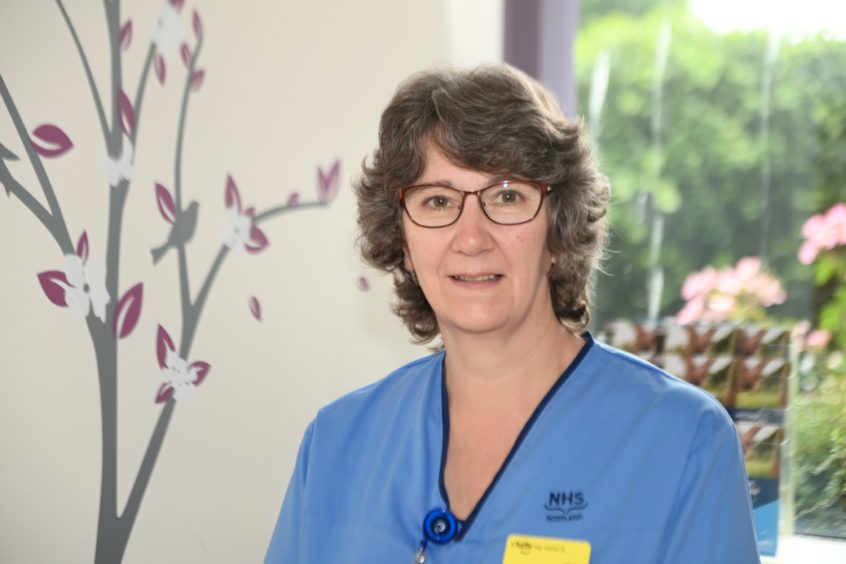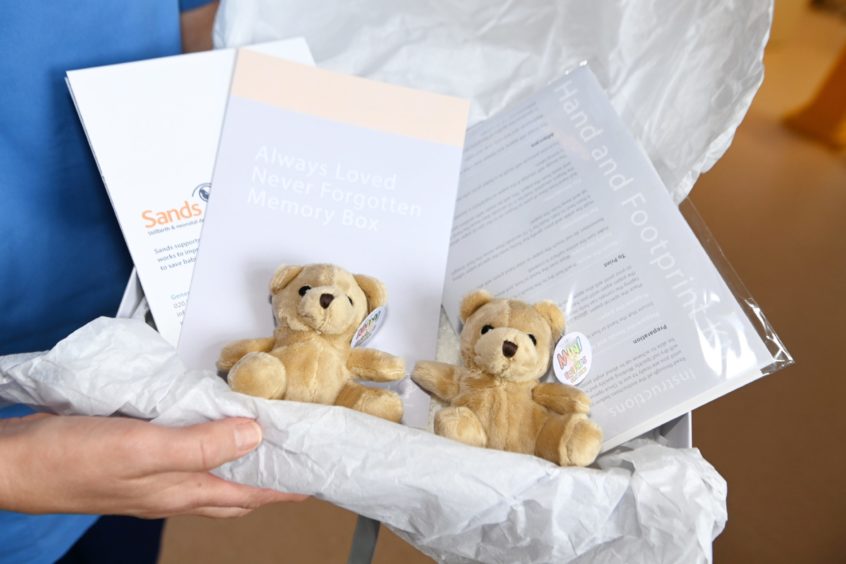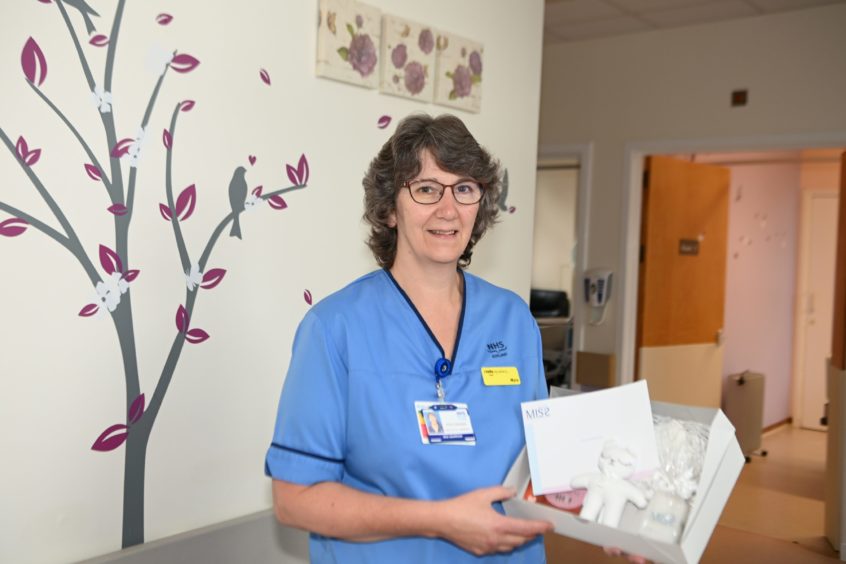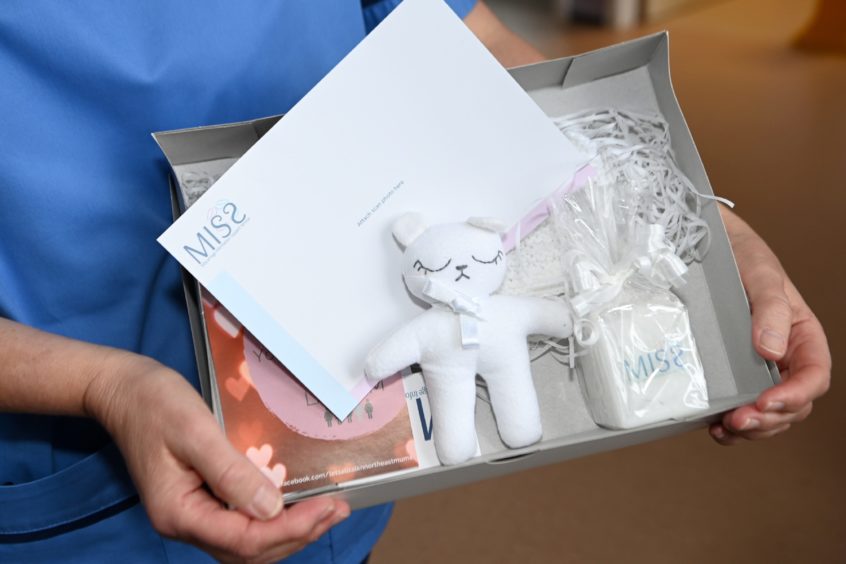It is often said that midwifery is not a job, but a calling.
To bring new life into the world, to hear the first cry and witness the bond unfurling is a privilege which only midwives can truly understand.
But as thrilling as it is for every mother who emerges from hospital with her arms and heart full, there are families who must leave with an empty car seat.
There will be the mother who never quite made it to the 12-week scan, or for whom pregnancy took a devastating turn after months of excited expectation.
One in four women will experience a miscarriage, and more than 100 miscarriages occur every month across Grampian alone.
Who do you turn to when the unthinkable happens, be that the heart-breaking decision of termination due to abnormality, or the tragedy of a still birth?
Myra Kinnaird is there should you need her, with her kind face and years of experience.
There is nothing you cannot voice to Myra, no circumstance too complex, in order for her to make sure you receive the best possible care after loss.
Myra, who is based in the Rubislaw ward at Aberdeen Maternity Hospital, has been working in pregnancy loss for 20 years, having qualified as a midwife in 1986.
Although she may not witness the day-to-day joy on the maternity ward, Myra sees hope bloom through supporting parents who try to conceive or fall pregnant again after loss.
Your Life recently explored why miscarriage remains taboo within society, and several women told their stories alongside the work of MISS – a miscarriage support charity which helps hundreds of people across the north-east every year.
Here, Myra explains the changes which have occurred in a hospital setting, and what still needs to be done.
Support on offer
“I feel very passionate about giving bereavement care, when it used to be way down the list on maternity care,” says Myra.
It’s not really something people speak about or acknowledge, and it is only now that we are learning that great bereavement care can have so many implications
“The National Bereavement Care Pathway came to Scotland in 2018, and NHS Grampian was a pilot area.
“Everyone in Scotland will receive the same care wherever they are, it’s not a postcode lottery.”
Aberdeen offers a dedicated area for pregnancy loss at Rubislaw, meaning bereaved parents are not taken to the maternity ward following a loss.
Myra works with a team of midwives, based in both Aberdeen and Dr Gray’s in Elgin.
“It’s called the bereavement team, they give clinical care and signpost,” says Myra.
“They provide a follow up after a hospital setting, and after that if staff feel someone is really struggling, they are signposted to myself.
“I work very closely with MISS, and the support they offer can be incredibly helpful.
But sometimes people might want to ask more about their experience in hospital, and I know what an impact it can have to answer those questions about things they are really worried about
“I can support them and help them move on, and that’s the rewarding part for me.
“Students often say they really enjoyed their placement with me. Maybe enjoy isn’t the right word, but it’s to feel passionate about giving that care.”
Questions answered
“Why should people who have experienced a loss get different care from someone who has had a baby?
“Well, it is a different kind of care, absolutely, but it’s still a care they need to have.
“There’s much more input from staff through sitting and listening, there’s no checklist.”
Although we have come a long way in terms of speaking about baby loss, Myra believes there are still further changes to be made.
“We’re not there as a society,” she says.
“We’ve only just started speaking about later losses, never mind miscarriage.
People don’t speak about death enough in any manner. I think it’s that Scottishness in some ways, we are a bit guarded about speaking openly about things
“Sometimes when people ask ‘how are you’, they don’t expect a barrage back. They just want you to say you’re fine. You need someone to listen.
“Most people go through that grieving process, and life still goes on around you.
Rewarding role
“It’s how you get answers, that’s the key part. I love that people have questions, sometimes very simple questions.
“But the answer has a huge input on how they can process that grief.”
Bereavement care covers the “whole gambit”, from early pregnancy loss to termination for abnormality, mid-trimester losses, early neonatal deaths and still births.
Rubislaw offers eight rooms: five for early pregnancy losses, alongside cooling cots where parents can stay with their baby for as long as they wish.
“It has been a challenge, the realisation that women need this care in a dedicated setting,” says Myra.
“But it is a real privilege to be looking after women and their families in the first place.”





